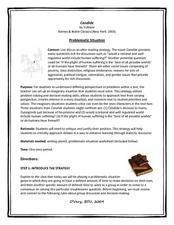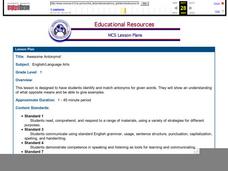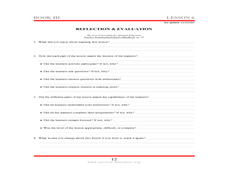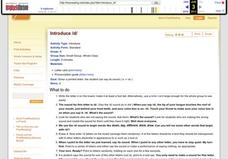Curated OER
Discovering Language Arts-Intermediate Fiction
Explore the elements of science fiction. Students investigate the literary elements present in science fiction and write their own science fiction stories.
Curated OER
Introduce /g/
As your emerging readers are learning the alphabet, set them up for success with strategies like these that incorporate multiple contexts and learning styles. Focusing on the letter g, write it clearly on the board. Model the /g/ sound,...
Curated OER
Reintroduce /o/
There are many words that begin with the /o/ sound; scholars study this letter in multiple contexts including intial phoneme examples, pronunciation, and letter recognition. Write the letter on the board to see if learners can identify...
Curated OER
Candide: Problematic Situation
"Would a rational and well-regulated world include human suffering?" "If the plight of human suffering is the 'best of all possible worlds' do humans have freewill?" Class members develop their position on an issue raised by Candide,...
Curated OER
From Light to Dark and Back
Experiment with light and dark in a series of interactive activities that lead up to reading and writing poetry. Class members have the opportunity to observe their feelings while sitting in the light and dark and to play with shadow...
San Francisco Symphony
Mr. Lincoln Through the Eyes of Aaron Copland
Use Aaron Copland's symphonic piece, "Lincoln Portrait" to engage learners in a cross-curricular experience. They'll listen to the piece, watch a video, read the Gettysburg Address, and write a series of fact or opinion sentences. An...
San Francisco Symphony
Dear Mr. Copland and Mr. Ellington
After a teacher-led demonstration on the lives and music of Aaron Copland and Duke Ellington, learners write a letter to them which shows their understanding of how a person's life experiences can be reflected in a composer's music. They...
Houghton Mifflin Harcourt
Give It All You’ve Got!: Extra Support Lessons (Theme 2)
Understanding word parts can play a crucial role in understanding a word in the context of a larger text. A series of extra support resources designed to accompany Theme 2: Give It All You've Got offers activities related to grammar and...
Curated OER
Origin of the Modern Summer Games
Where did the Olympic Summer Games originate? The class takes a look at ancient origins of modern Olympic games. They research the Olympics and write a compare and contrast essay that describes how the Olympic Games have changed since...
Curated OER
Awesome Antonyms
Review with your young learners what opposites are and use a fun tag board game called Auntie Alice to practice. After the class plays the game, pairs work on computers practicing with interactive matching/flashcards/concentration games...
Curated OER
How to Explore Religious Teachings Without Prejudice
Setting goals plays a major role in becoming a self motivated learner. Students will read and discuss a story, set personal goals, and analyze a sacred prayer. This lesson includes: teacher evaluation, goal worksheet, prayers, story, and...
Curated OER
Butterflies Fly!
Chopin was a lovely composer who played the piano masterfully. Third graders are introduced to Chopin, his piano sounds, triple meter, music patterns, movement, and the waltz. They listen to his music while hearing the story Butterflies...
Ellsworth American
Think About the Newspaper
Investigate the significance of adjectives with a newspaper activity that addresses effective language. Readers probe teacher-provided articles in search of the mighty modifiers, and practice by replacing them with a different word, and...
Curated OER
Antonyms, synonyms and homophones
Shed light on what antonyms, synonyms, and homophones are. In this lesson, upper elementary schoolers create pairs using an antonym, a homophone, and/or a synonym. Then they play an antonym matching game.
Curated OER
Phrases and Clauses Recognition
In this identifying phrases and clauses worksheet, learners read definitions and examples and use them to determine the identify of the groups of words in the review. Students write 15 answers.
Curated OER
Allusion in Poetry
Emerging writers identify allusion in poetry by listening to recorded poems, like Anyone Lived in a Pretty How Town. They also discuss what makes writing satirical and how writers use allusions to make satirical points.
Curated OER
Iran Hostage Crisis: Reading Primary Documents
Following brief instruction about the Iran Hostage Crisis during Jimmy Carter's presidency, small groups read three-page sections from the diary of hostage Robert C. Ode. They write editorials from the perspective of either U.S. citizens...
Curated OER
Irony
Using examples from Socrates to Johnny Carson, this slideshow presents your students with the history and definition of dramatic irony, satire, situational irony, and tragic irony. This presentation would be useful in a language arts...
Curated OER
Refugees at Center Stage
What is an advocate? Help high schoolers understand the issues forcing refugees to leave their home country. After gaining some information on the subject, high schoolers create a dynamic presentation and persuasive essay encouraging...
Curated OER
Prefixes
Provide an opportunity for scholars to play around with words. They start with 12 root words and add prefixes to them to create new ones. There are five prefixes here, and learners list the new words beside each. Consider reviewing the...
Curated OER
Introduce /m/
Start by drawing a large letter m on the board for scholars to see. Do they know what letter this is? Once you've demonstrated the sound it makes, use these tips to help them make the same sound. There is even an audio pronunciation...
Curated OER
Introduce /f/
Hook your scholars by drawing a large f on the board; do they know what letter this is? Once you've demonstrated the sound it makes, use these tips to help them make the same sound. Although the audio function is neat, it may not be...
Curated OER
Introduce /d/
Give youngsters a better grasp of the letter d by combining letter sounds, pronunciation, recognition, and word examples. Scholars examine the letter shape then listen to you make the /d/ sound and try it on their own. Kids brainstorm...
Curated OER
Introduce /u/
As scholars are learning about letter sound correspondence use this activity to help them with the /u/ sound. Learners examine a large u on the board, identifying it if they can. They listen to you make its sound, explaining to them what...

























